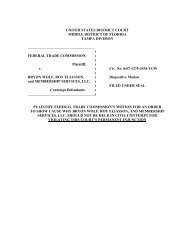HELO RCPT TO QUIT MAIL FROM DATA - Federal Trade Commission
HELO RCPT TO QUIT MAIL FROM DATA - Federal Trade Commission
HELO RCPT TO QUIT MAIL FROM DATA - Federal Trade Commission
You also want an ePaper? Increase the reach of your titles
YUMPU automatically turns print PDFs into web optimized ePapers that Google loves.
<strong>Federal</strong> <strong>Trade</strong> <strong>Commission</strong><br />
IV. Conclusion<br />
implementation of competing authentication proposals. 79 Other promising<br />
developments include progress toward reputation and accreditation services to<br />
correct the flaws inherent in the self-regulating, autonomous nature of the current<br />
email system. 80 Meanwhile, ISP blocking and filtering, and consumers’ ability to<br />
enable other protective measures, as noted previously, have greatly improved, and<br />
will likely continue to become more effective. These trends promise, ultimately,<br />
to arrive at an email system built on accountability. Without authentication and<br />
accountability, spammers will continue to use falsity and deception to send their<br />
spam, and a federal requirement mandating subject line labeling likely will not<br />
change the spammers’ actions.<br />
For the foregoing reasons, the <strong>Commission</strong> concludes that subject line<br />
labeling, while it might identify UCE sent by law-abiding marketers, likely would<br />
not have any measurable impact on the fraudulent spam sent by outlaw spammers.<br />
Consumers already have technological options to identify UCE sent by lawabiding<br />
marketers. The <strong>Commission</strong> recommends, therefore, that Congress not<br />
enact a subject line labeling requirement. Emphasis and support would more<br />
productively be directed to encouraging emerging industry efforts to combat<br />
spam. Accordingly, industry and government are diligently working towards<br />
alternatives to the likely ineffective strategy of subject line labeling. These<br />
alternatives may promise to alleviate the spam problem through new technologies,<br />
improved enforcement, and consumer and business education.<br />
79. The FTC discussed email authentication in depth at its “Email Authentication Summit” held in<br />
November 2004. See more detailed discussion, as well as specific authentication proposals, at http://www.<br />
ftc.gov/bcp/workshops/e-authentication/index.htm. The <strong>Commission</strong> recently established a website designed<br />
to allow ISPs and other operators of email servers to share the results of tests performed on various domainlevel<br />
email authentication proposals. The website invites companies that are testing email authentication<br />
standards to answer several technological questions regarding the functionality, interoperability, scalability,<br />
and effectiveness of these standards, and to update their responses as new information becomes available.<br />
By sharing testing results, these members of the public will help identity the domain level authentication<br />
standard (or standards) that is most effective at combating spam, can be deployed quickly, can be used easily<br />
by unsophisticated operators of email servers (such as small businesses with their own mail servers), and<br />
costs little to use. The website is intended to help standards proponents to identify potential problems (such<br />
as non-spam messages being treated as spam), and to help operators of mail servers who test the various<br />
proposed standards to identify solutions to the problems that reveal themselves. Access to the website is<br />
available at http://www.ftc.gov.<br />
80. ESPC: Hughes, 23, 33; Earthlink: Youngblood, 23; AT&T: Israel, 23; UOL: Squire, 23-24;<br />
Microsoft: Katz, 18-21.<br />
18

















